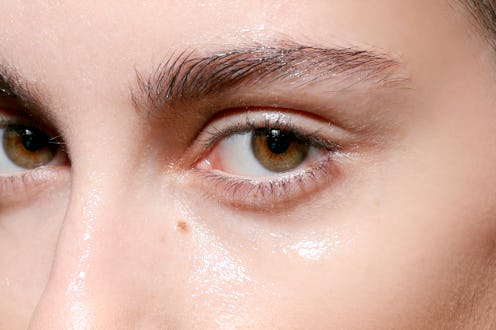(Beauty)
This Is What Happened When I Stopped Using Skincare Products Completely

I live and breathe skincare as both my job and my hobby — but most nights, I use approximately zero products. Zero. Zilch. Nada. None. Just water for me, thanks. I began taking extended breaks from my beauty routine about three years ago, inspired by Adina Grigore’s book Skin Cleanse. The concept has since taken off, and is often referred to as “skin fasting” or “skin detoxing.” No matter what you call it, the premise is the same: Stop using skincare products, and watch your skin thrive.
I admit, it sounds a little strange — and also a little scary. But at the time of my first “skin cleanse,” I was in the midst of a two-year struggle with dermatitis and was desperate for something, anything, that would help. I literally could not think of anything more desperate than skipping my twice a day cleanser-toner-serum-moisturizer-oil-medicated ointment ritual. It was my religion, my church, my reason for getting out of bed in the morning. But guided by Grigore’s words, I did it. I ditched everything. And guess what? Seven days of zero products later, my skin was 75 percent clearer.
“I do think there is something to be said for simplicity,” Dr. Jennifer Vickers, M.D., a board-certified dermatologist with Sanova Dermatology, tells The Zoe Report. “I see many patients using multi-step regimens for their skin, and while they may benefit from a good skincare regimen, allowing the skin to reset from time to time will likely reveal unexpected benefits.” She likens it to an elimination diet for the face: “By pausing your routine, you may find out that you are using a product that doesn't agree with your skin or is unnecessary,” Dr. Vickers says. “You also allow your skin to recover its barrier and to resume production of sebum, the natural oily substance that our skin produces to keep the bad things out and the good things (like water) in.”
Skin fasting's raison d'etre lies in that last sentence: Not only does it give your skin a chance to breathe, it gives it a chance to resume its natural functions. The skin actually has built-in mechanisms to self-moisturize (sebum), self-exfoliate (desquamation), and self-heal. Oftentimes, skincare products suppress or overwrite these functions rather than support them, which can lead to a whole host of skin issues, including barrier damage and dehydration. That, of course, makes you reach for more products — the exact opposite of what the skin wants.
“Our skin becomes dependent on these [products], and doing a fast of them is going to force our skin to function on its own again, which is what it should be doing in the first place,” Angela Peck, a holistic aesthetician and the founder of Wholistic Skin + Care, tells TZR. Dr. Neil Sadick, M.D., F.A.A.D., a Manhattan-based dermatologist with Sadick Dermatology, corroborates this claim, saying, “If people are bombarding their skin with products, peels, and masks, taking a break may allow product buildup to be removed and skin can recover.”
Be warned: The recovery phase isn’t always easy. “It gets ugly at first as the skin goes through the process of losing its dependency on the products that it was relying on for a lot of its functioning,” Peck says. Take exfoliators, for example — the purpose of exfoliating is to speed up cellular turnover. When you stop, your skin slows to its natural turnover rate (a 28-day cycle), and that could lead to clogged pores as your cells adjust. Or, if you’re regularly using a too-drying cleanser, your skin has likely learned to produce extra oil to make up for it — and skipping out on your usual cleanser makes it seem like your oil production is out of control. This explains why some people experiment with skin fasting for a few days, experience issues, and run back to their products ASAP. Really, the skin just needs more time to adjust. “A week or two of skin fasting should be sufficient to let the skin reset and breathe,” Dr. Vickers says.
The dermatologist adds that there are “no hard and fast rules;” meaning, your personal skin fast can look like whatever you want it to look like. You can discontinue all makeup and skincare for a week or two (except for cleansing thoroughly with plain water day and night); you can limit yourself to simply cleansing and moisturizing for a little while; you can skip your nighttime routine (again, except for cleansing with water!) for a few days and see what happens. There are a couple caveats to note: “You should never fast your skin from sunscreen [if you’re going outdoors],” Dr. Sadick says. “And people that are on prescription skincare should always be compliant with their doctors orders.”
Post-fast, you'll probably get the urge pare down your regular routine. My personal detox taught me that my skin is happiest when I cleanse well at night and skip it in the morning, use jojoba oil instead of creamy moisturizers, and sparingly spot treat with tea tree oil. The rest of my old products — the toners, essences, serums, masks, and meds? It turns out, I didn’t need ‘em.
That was years ago, and I still do micro skin fasts weekly. “I tell my clients to take time off from their products two to three evenings a week, or at least one weekend day,” Peck says. Not only does this allow the skin to do its thing, it also spares you the hassle of a 10-step regimen before bed. And clears some shelf space. And saves you money. Wait… why aren’t you skin fasting, again?
This article was originally published on